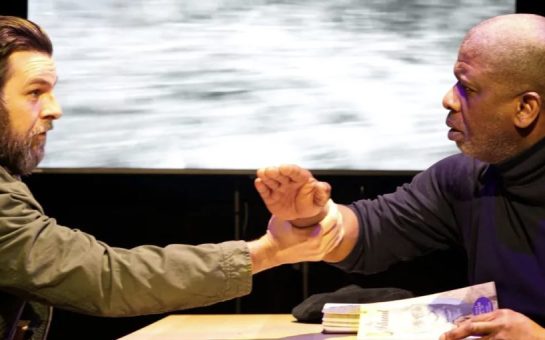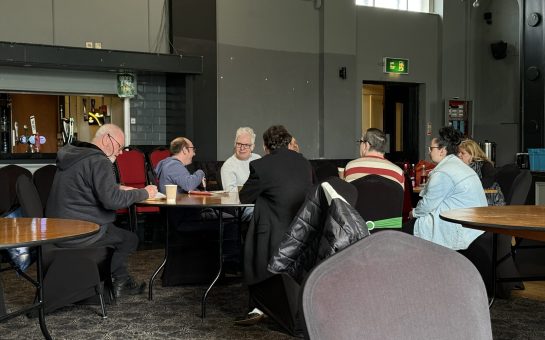With award winning actors and a community chorus of 53 Manchester residents, Home’s latest play The Oresteia takes the city by storm.
It opens bewilderingly with the lights on, breaking the normal conventions for those seasoned theatre-goers as a lead actress hoisted into the air on a swing.
It swiftly moves into the action with a blast from the male chorus, predominantly populated by community performers, breaking the silence and introducing the story.
A story of murder & revenge, gods & monsters – have you seen #TheOresteia yet? https://t.co/q0NK7oJc9H https://t.co/YuwlE0xUXn
— HOME (@HOME_mcr) November 2, 2015
Blanche McIntrye, director of the piece, said: “The Oresteia is epic in its themes, experimental in style and contemporary in its impact.
“It is a classic text about justice and where humans stand in the world.
“The language is heightened but not remote, so each line packs a punch.“
The Greek play is one of the earliest plays that we have full copies of and was first performed in 458BC.
Ms McIntrye linked current world events to the themes experienced in the performance.
She said: “Current events in Syria make it impossible to think of The Oresteia as anything but a contemporary text.
“The suffering war causes to ordinary people, the effects of violence and extreme grief, are present in the play and on the news, and part of the role of the play is to present human suffering.”
The female lead, Lyndsey Marshal, originally from Manchester has previously acted alongside Meryl Streep, Julianne Moore and Nicole Kidman in cult-hit film The Hours.
She was nominated for a Lawrence Olivier Award for her work in the film and her current role is her first stage performance in her home city.
Next year sees the actress, who has had 15 years in the industry, hit the screens alongside Michael Fassbender in a British crime film.
We certainly wouldn’t want to come across a Fury this #Halloween Oresteia, 2015, Adele Thomas pic.twitter.com/0xdmaKk52n
— Shakespeare’s Globe (@The_Globe) October 31, 2015
Simon Trider, based in Bolton, is the male lead Orestes and has an animated, comical part to play with side jokes to the audience and a lively, quirky delivery.
The actor has over 50 radio plays for BBC4 to his name and has performed with the highly thought of Royal Shakespeare Company, The Royal Court and The Young Vic.
He has also appeared alongside Pete Postlethwaite at Manchester’s Royal Exchange in Shakespeare’s, popular, well-loved The Tempest in 2007.
With a string of TV and film credits under his name including Luther, Holby City, Eastenders and Bridget Jones: The Edge of Reason, second male lead, Gary Shelford has an interesting role.
The actor takes on three parts such as the ill-fated husband and hero Agamemnon, greek god Apollo and cross-dressing sister of Orestes, Electra.
The director said: “Greek plays work differently from modern ones – the audience used them as a kind of political investigation, an engine for thinking, so they aren’t naturalistic.
“In Athens, two-three actors would have played all the parts, someone plays husband and wife, or killer and victim, who are written never to be on stage at the same time.”
Seen an interesting take on #Oresteia @HOME_mcr tonight. Beautiful staging and fab cast. Thanks for a lovely evening @AgentMarsden!
— Jane Anderson CDG (@JaneAndersonCDG) October 28, 2015
Seeing the previously masculine Agamemnon change into a pure, white slip is a sensitive and intriguing part of the play, dealing with gender issues delicately and bravely.
Character doubling is a key feature throughout and a convention of Greek theatre, meaning that characters often played others which could risk confusion.
The community chorus parts are made up of local city-dwellers and 16 MMU drama students, opening up important opportunities for local people to take to the stage.
The design of the piece was one of the key stand out elements to the play with aspects influenced by minimalist Japanese design.
An impressive feature is the moveable sand which can be raked to reveal a hidden path and dug to reveal graves and secret chambers.
The chainmail works well at the back of the stage which looks huge with such a simplistic set, jangling and clanging when the spirits from the dead arose.
Of course, blood and guts play a significant part in this epic tragedy with murderous acts flowing throughout.
Saw Oresteia last night.What a cosy evening of full on family genocide and a big ol bath of blood soaked fun. Blimey.The full Greek.chilling
— Dawn French (@Dawn_French) November 1, 2015
Though they are tastefully executed with some great use of lighting.
Manchester is particularly apt for this play to be performed in and important for the director because of its cultural and social heritage.
Ms Blanche said: “Staging it here gives it an important resonance – just as Athens was, Manchester is a city where the collective good has been the cause of powerful debate and struggle.
“In the current situation of increased political engagement and in the context of the Northern Powerhouse proposals.
“It feels right to work on a play in which the right to administer justice is transferred from a small family to the people.”
Director of Home Walter Meierjohann said: “The Oresteia remains one of the key pieces of the history of drama.
“It seems even more appropriate to be doing this in Manchester in 2015, a great city with a long, noble, and continuing history of agitation for the greater good.”
The play is, although bloody in parts, a great adaption of a classical text and left a lasting impact.
The Oresteia will be on until November 14 at Home. For tickets, click here.



